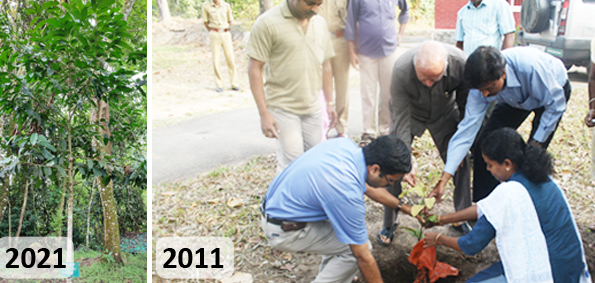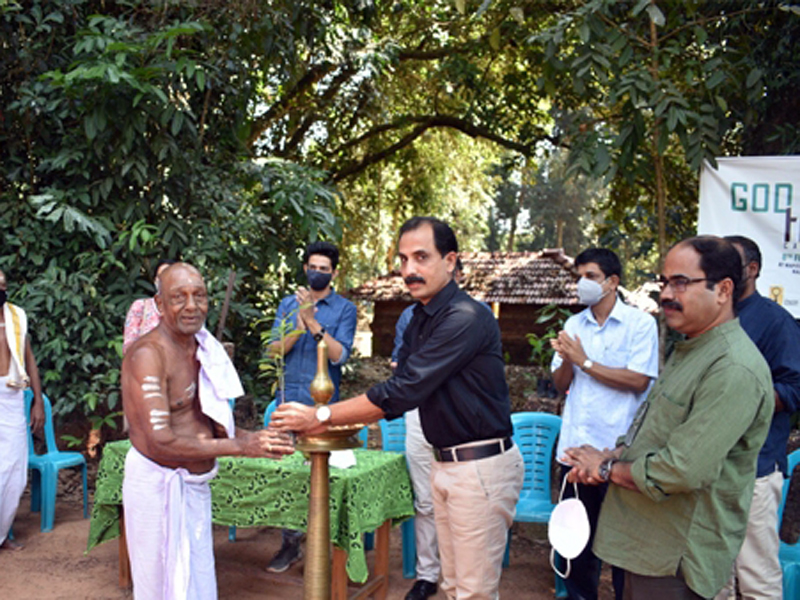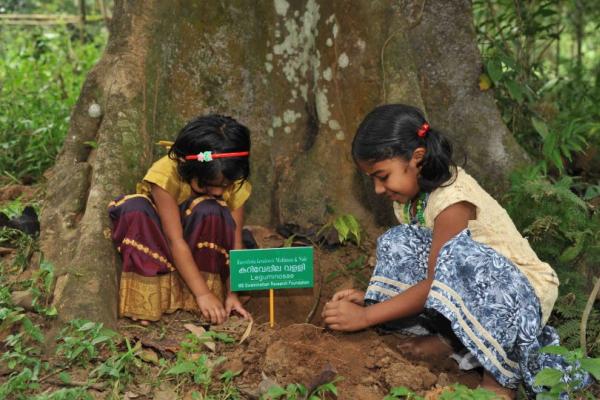In 2006, MSSRF commemorated Prof. Swaminathan’s 80th birthday by launching a project designed for studying and locating 80 endangered plant species found in the Western Ghats. The year also coincided with his 50 years of legendary contributions and MSSRF’s 15 years of services to Indian agriculture. This three-year project supported by the Tata Trusts had resulted in producing 3 PhD dissertations describing some authenticated information and data on the area of distribution, the status of endemism, collection, cataloguing and conservation of not only all the targeted 80 species but many other plant taxa of conservation value in the region.
The most significant outcome of the project was the emergence of an ex-situ Conservatory with collections of over 1800 plant species and a small herbarium of special plants. In 2020, this conservatory, which being known as M. S. Swaminathan Botanical Gar¬den (MSSBG) comprised an arboretum of over 150 tree species was recognized with the Level 1 Accreditation under the ArbNet Program promoted by the Morton Arboretum in Lisle, Illinois. MSSBG became a member garden in the network of the Botanic Garden Conservation International (BGCI) in 2014, and one of the Lead Gardens promoted by the Ministry of Environment and Forests, Govt. of India for conserving Rare, Endemic and Threatened plants of Western Ghats. In the same year, the Denver Botanic Gardens of USA extended help in developing a Master Plan for the next phase of growth of this garden.

While Prof. Swaminathan marks his 96th birthday on August 07th, the Garden team of MSSRF launches an eco-restoration project by choosing 100 Rare, Endemic & Threatened (RET) plant species, including those 80 species that are conserved in the MSSBG. We have a working list of 116 endemic species, among these 14 are critically endangered, 28 endangered, 19 vulnerable and 55 rare with limited populations. See Annexure. This project is launched at the beginning of the UN decade on Eco restoration to empower the world leadership for rehabilitation and restoration of the degraded sites. This Project will be an answer to the global rallying cry for science-based Ecosystem restoration. Incidentally, the year 2021 also marks the 25 years of MSSRF’s Community Agrobiodiversity Centre of Kerala, which houses MSSBG.
GOD Plants! Save Sacred Groves & Village Forests!
This project is titled “Grow Our Dying (GOD) plants” and aimed to rehabilitate the selected 100 species in at least 100 degraded Sacred Groves and Village forests within 5 years or while Prof. Swaminathan reaches his 100 years. We have located 100 degraded sites, which include Sacred Groves that are associated with households, temples, churches and mosques and many village forests from Kerala. These sacred sites/micro forests are degraded or encroached or restored with the ‘wrong’ choice of species. Sadly, the disappearance of village trees and forests and degradation of ecosystem services remains unnoticed or rarely spoken about compared to the Climate talks that happen in cities. We framed up this project in this context and to leverage our decadal experience in tree planting and greening educational campuses. So far we have planted over a million trees, many are the RET species across Kerala.
Prof. M. S. Swaminathan once stated, “greening of the human mind must precede the greening of our Earth. A green mind cares, saves, and shares. These are the qualities essential for conserving biological diversity now and forever”. Let’s take his 96th birthday to build the Green minds together for Saving species and Saving lives. For the estimated cost of rehabilitation and restoration of one species, we calculated INR 100,000/. We, Indians are good at helping others by everyday giving, especially for the community needs, religious causes, followed by urgent situations like natural disasters. The situation of saving the endangered species is squarely urgent now for community, religious belief systems, and for Mother Nature to keep her healthy! Gear Up for GOD species!


